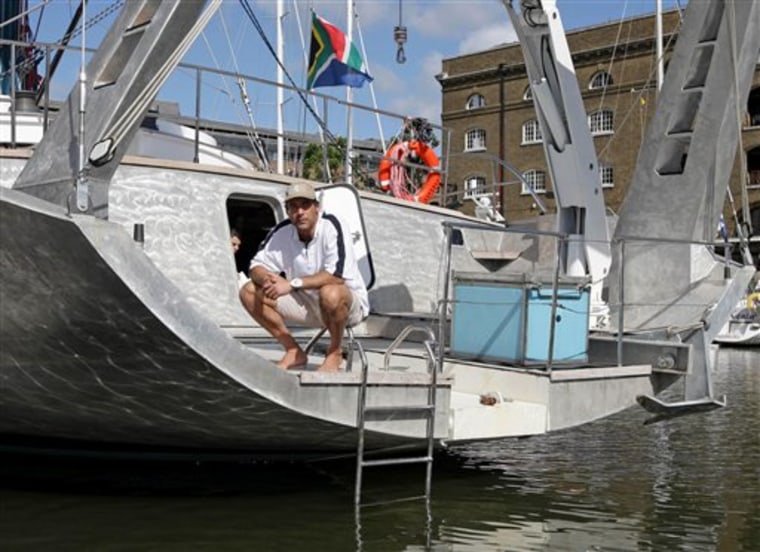After traveling around the Arctic Circle alone, walking across South America, venturing through African war zones and hiking deep into the Amazon, Borneo and Sumatra jungles, Mike Horn is ready to embark on his most ambitious project yet.
The 42-year-old South African adventurer is set to go on a four-year environmental outreach expedition around the globe, aiming to cover 62,000 miles, cross all the continents and oceans, and reach the North and South Poles.
He will walk, kayak, cycle, paraglide, ski and sail across rivers, lakes, mountains, desert, jungle, tundra and ice fields. Working with educational specialists along the way, Horn hopes to inspire young people to clean up the planet and make people aware of the Earth's gloriously uninhabited areas.
"After 20 years of exploration I cannot change my life, so I have decided to share more what I have done with the younger generation," Horn said Monday. "I'm just an explorer who wants to keep my playground clean."
He spoke from his 115-foot yacht, Pangaea, named after the expedition and the supercontinent that existed millions of years ago, docked on the Thames close to the Tower of London.
Pangaea's aim is to "cultivate respect for the environment and the protection of its resources for the sake of future generations." Along the way young people aged 13-20 will be invited to join Horn and learn about flora and fauna, and humankind's interaction with nature and the elements.
Horn's two daughters, aged 14 and 15, will join him on school holidays.
The aluminum boat will run on solar energy and is designed to navigate oceans and cope with all conditions from the arctic to the tropics. It will include hydrogen fuel cell technology, solar panels and recyclable materials and be used for research, environmental and educational projects.
Solar panels will charge the batteries of the vessel, and because solar energy is difficult to store over a long time, it also has a system comprising an electrolyser, hydrogen storage and a fuel cell.
The expedition kicks off October 9 from Punta Arenas in Chile. From there, Horn will head to Antarctica, where he will trek to the South Pole. Then his route meanders through New Zealand and China, then through Russia to the North Pole, across Greenland, over to North America and back down through South America to Punta Arenas.
"I think humans are one of the most dangerous animals that's around," said Horn. "We are basically destroying the mother that's going to feed us."
The expedition also aims to establish youth and environmental projects in some areas it visits, in particular water, biodiversity and social community projects.
Horn was born in Johannesburg and later moved to Switzerland to work as an instructor for extreme water sports, including riverboarding, canyoning and rafting. He then turned to exploring the planet.
In 1997, he undertook an unmotorized crossing of South America, using a riverboard to navigate the Amazon River.
Two years later, he traveled the world around the Equator in 18 months. He crossed the Atlantic Ocean from Gabon on a 28-foot trimaran, and walked, cycled and canoed from Brazil to Ecuador. He crossed the Pacific Ocean to Indonesia, journeyed through Borneo and Sumatra on foot and then continued across the Indian Ocean.
The final part of his journey took him across Africa on foot through Congo war zones. This expedition won him the 2001 Laureus World Alternative Sportsperson of the Year Award.
In 2004, Horn completed a two-year solo circumnavigation of the Arctic Circle by foot, sled and canoe, becoming the first man to travel it without motorized transport.
Two years later, Horn and Norwegian explorer Borge Ousland became the first men to travel without dog or motorized transport to the North Pole during the permanent darkness of the Arctic months.
"To really go into the unknown every day is exciting at the same time as it's scary," Horn said. "If I stop being afraid of doing what I do, I will stop doing what I do."
